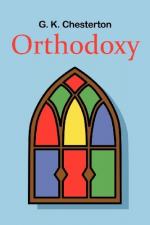
|
| Name: _________________________ | Period: ___________________ |
This quiz consists of 5 multiple choice and 5 short answer questions through Chapter VIII: The Romance of Orthodoxy.
Multiple Choice Questions
1. What does Chesterton not mean by the word "orthodoxy"?
(a) The history behind the creed.
(b) Where Christians get the authority for the creed.
(c) The practical outworking of the creed.
(d) The Biblical authority for the creed.
2. Why, according to Christianity, can passions be free?
(a) Because they are kept in their proper places.
(b) Because they are monitored by the church.
(c) Because a believer's conscience keeps him from extreme passions.
(d) Because their consequences will not come until the afterlife.
3. What does Chesterton explain as his method for proving his argument?
(a) Presenting each tenet of a well-reasoned case for Christianity.
(b) Laying out arguments with an acronym he came up with for his faith.
(c) Laying out each argument as he refuted the skeptics.
(d) Laying out arguments as he had thought of them, and then discovering they were already proven in Christianity.
4. According to Chesterton, at the beginning of Chapter Two, what happens to the men who believe in themselves?
(a) They end up in insane asylums.
(b) They are never properly appreciated.
(c) They achieve far more than other men do.
(d) They have difficulty maintaining that belief.
5. What conclusion does the complete skeptic eventually reach?
(a) He has no right to think for himself.
(b) There are no answers to be found.
(c) No one else can think for him.
(d) He will never find the answers.
Short Answer Questions
1. Who is Mr. Blatchford?
2. In fairy tales and fiction, what change does Chesterton name that makes the stories monotonous?
3. How does H. G. Wells perceive categories of things?
4. Why does Chesterton say there is no equality or inequality in nature?
5. What does Chesterton name as the chief pleasure?
|
This section contains 359 words (approx. 2 pages at 300 words per page) |

|




